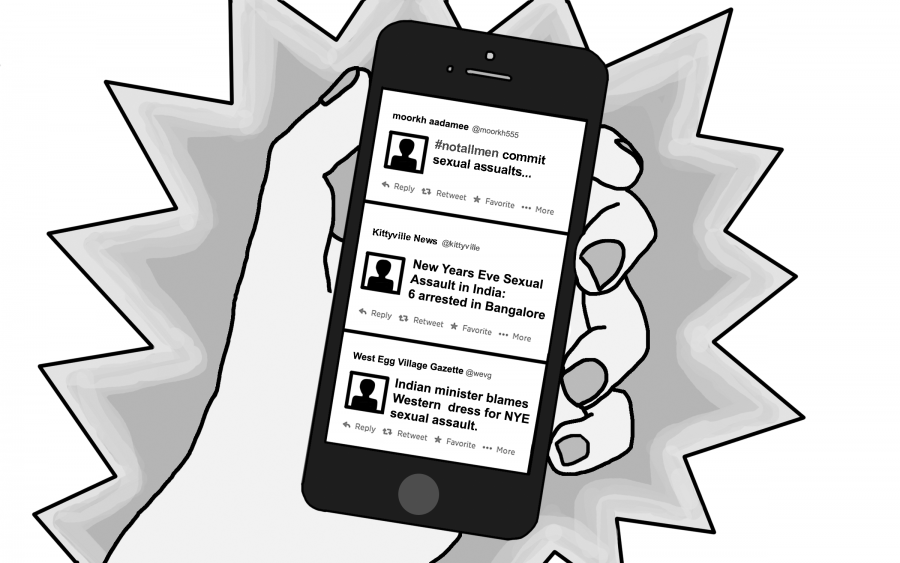I wished I were wearing a burlap sack with eye holes instead of shorts on the kind of Indian day that could melt steel.
Sitting back in my chair, I attempted to pull my shorts down further, praying they would become pants as I nervously glanced at the boys no older than myself at the next table. I could hear their loud, lecherous whispers and feel their penetrating stares down my legs.
I wish I didn’t understand Hindi in those moments — they wanted to take me home with them, and no, not for tea. My cousin mumbled to me as we meandered away from the area, “They liked you!”
On New Year’s Eve, a group of women were reportedly sexually assaulted in downtown Bangalore, India.
Although there are a multitude of witnesses and evidence, Bangalore’s police chief cast doubts on the validity of the attacks. Indian men responded in droves via Twitter with the trending hashtag #NotAllMen.
But say #NotAllMen to the man who pulled up my shorts to grope me in a train station or the man who aggressively stalked me through India’s most famous place of worship. No, not all men, but enough men. Rape culture is societal behavior; it does not refer to a handful of people but a system taught to every person regardless of gender.
Why did I feel guilt when others objectified and disrespected my body? I was taught that my clothing was my fault and that I was responsible for the way others treated me for it consequently.
In colleges, professors infiltrate classrooms with sexism and sexual harassment but are acquitted every day on first amendment grounds, gutting minorities’ right to a non-discriminatory education. However, most of these instances are never reported at all.
Americans tend to believe that they are years ahead in women’s rights compared to “third world countries.” I know I certainly did. Perhaps this is correct in some ways. But I did not learn rape culture in India.
I learned from birth right here in Los Angeles. When strangers suggest to your friends that they should “roofie you” in rental car parking lots in Texas or grown men rave about their fetish for “exotic women” to your face on a six-hour flight, you begin to realize there are more uncomfortable similarities between the two countries.
Like the Bangalore police chief, most instantly cast doubt on sexual assault and domestic violence despite significant evidence, like with Donald Trump or Bill Cosby.
While these men could be innocent, the issue is that Americans can’t believe that rape happens in their country at a high rate. The doctrine of “comparatively better” isn’t good enough anymore.
Many shy away from social reform because it doesn’t affect them or it is too difficult to be done.
But this social reform is easy: reevaluate the way you treat women and view gender.
Rape culture hits home in more than one way: catcalling, unwanted groping and a litany of other devaluations of women’s bodies. Traveling to India has fundamentally adjusted my perspective on America’s platitudinizing towards women.
Please don’t wink and holler at me from your car or tell me that I was asking for it or call me a “bitch” because I said no.
You don’t have to call it feminism or rape culture if that scares you. Just think of it as basic human decency.































